Farming Policy, Stalin, and the Great Elon Distraction
What Musk gets wrong about inheritance tax—and what we should actually be talking about.
Today, on this freezing Tuesday, farmers from across the UK are set to bring their John Deere tractors, combine harvesters, and various other farming implements to protest the Labour government’s new inheritance tax (IHT) rules. There’s no doubt about it: it’s a tense situation. Emotions are running high, and common sense suggests that, if anything, this might be the time for calm heads and constructive dialogue.
Not according to Cissy SpaceX.
Oh no. Instead of showing even a shred of restraint, Elon Musk decided to hurl himself into the fray like a drunk uncle at Christmas, proclaiming on Twitter—or whatever he’s calling it this week—that “Britain is going full Stalin.” Subtle. Thoughtful. Measured. The sort of insight one might expect from a man who spent $44 billion to turn Twitter into 4chan for Tesla owners.
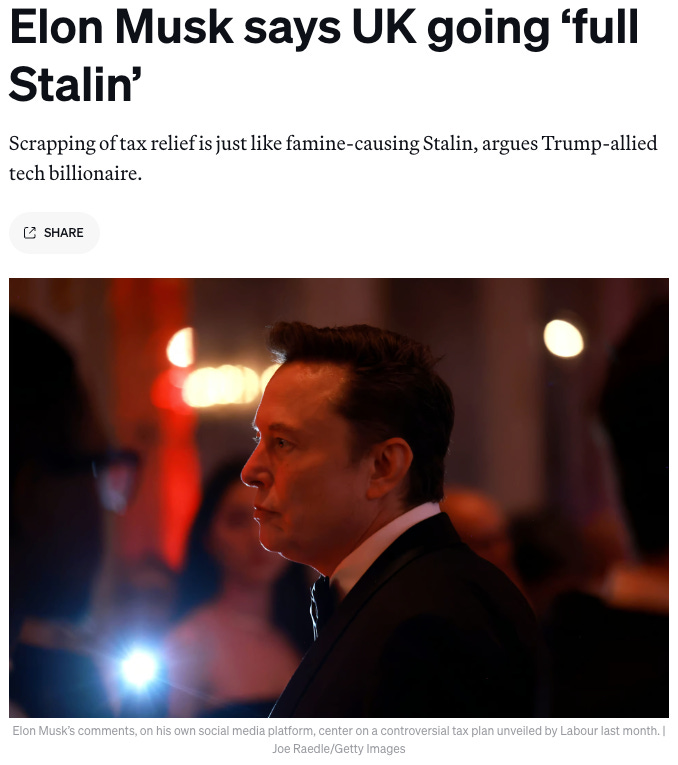
But since Musk clearly has no intention of engaging with reality, let’s take a moment to do so for him. Because not only is this Stalin comparison laughable, it’s a dangerous distraction from the real issues farmers are facing.
What Actually Happened Under Stalin?
First, a little history lesson for those whose knowledge of Stalin begins and ends with a meme. Under Joseph Stalin, Soviet farmers weren’t asked to pay a modest inheritance tax. They were forced into collectivisation, which meant their land, livestock, and equipment were confiscated by the state. The process of collectivisation, which began in 1928, impacted roughly 25 million small farms across the Soviet Union. If you didn’t comply, you didn’t just get a stern letter from the Treasury—you got sent to a Siberian gulag or shot. Over 1.8 million people were deported to forced labour camps, and hundreds of thousands were executed. Entire families were displaced, often with just a few hours’ notice to leave their homes. The culmination of these policies led to the Holodomor, a man-made famine so catastrophic it defies comprehension, killing an estimated 3.9 million Ukrainians between 1932 and 1933. This was no bureaucratic nuisance; it was state-sanctioned terror on a massive scale, one that decimated rural communities and left millions dead or in abject misery.
That’s “full Stalin.” It’s a grim, bloody chapter in history, not some half-baked metaphor to whip up Twitter engagement. So when Musk equates a policy designed to stop multi-million-pound estates from dodging tax with one of the 20th century’s most brutal regimes, it’s not just ahistorical—it’s grotesque. Honestly, if Elon wants to throw around Stalin comparisons, someone should tell him what collectivisation might look like in Silicon Valley. I’d love to see him explain to his Tesla shareholders why the government now owns all their lithium mines.
So, What’s Actually Happening in the UK?
Now, going back to planet Earth, let’s add some much-needed context to this discussion. The Labour government’s proposed changes to inheritance tax aren’t about seizing farms or redistributing wealth à la Bolsheviks storming the Winter Palace. They’re about closing loopholes that allow the ultra-wealthy to use agricultural property as a tax haven.
Currently, Agricultural Property Relief (APR) and Business Property Relief (BPR) let landowners avoid inheritance tax entirely. Originally meant to protect small, family-run farms, these reliefs have turned into a tidy tax dodge for millionaire lifestyle farmers—looking at you, Jeremy Clarkson—who use them to shelter wealth while playing at rural life1.
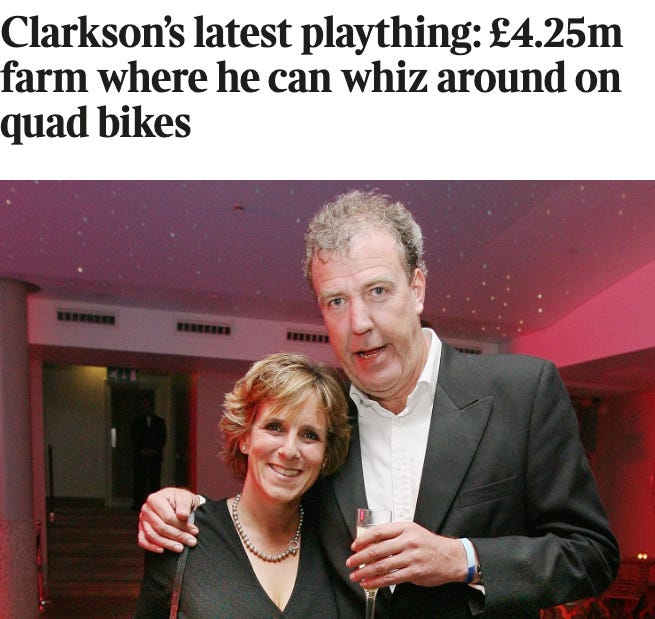
From 2026, these blanket reliefs will be capped. Estates will get up to £1 million in relief, with an extra £500,000 if conditions are met. For couples, that's £3 million in relief. Tax owed beyond this will be at 20%, not the usual 40%. This largely protects family-run farms under £3 million but clamps down on the wealthiest estates—often owned by investors, not real farmers—exploiting these perks.
The idea here isn’t to hammer small farmers but to close loopholes that turned agricultural land into a tax haven for wealthy investors. In fact, last year, traditional farmers bought less than half of England’s agricultural land; much of it went to private investors and “lifestyle farmers” who like the financial perks more than they like farming.
The fact is that Labour’s policy is more “mildly annoyed accountant” than “Stalinist land grab.” It’s about fairness and keeping the ultra-wealthy from gaming the system—not destroying everyday farmers.
But nuance doesn’t generate likes, does it? Why bother engaging with policy specifics when you can just scream “STALIN!” into the void and watch the retweets roll in?
The Real Problem: Profitability in Farming
Here’s the point that so many, many headlines and articles leave out: inheritance tax isn’t the biggest threat facing farmers—it’s profitability. Farming in the UK has been circling the drain for years. Margins are razor-thin, and farmers are asset-rich but cash-poor. A quarter of farmers could sell their land and retire as millionaires, but many struggle to scrape together enough cash to replace a tractor tyre.
And what’s the root of a lot of these issues? Go on, guess. It starts with a "B" and rhymes with "exit." That’s right—Brexit, the gift that keeps on taking. Leaving the EU cut farmers off from export markets and slashed the subsidies they relied on. It also buried them under a mountain of red tape that makes it harder to sell their products anywhere but the corner shop.
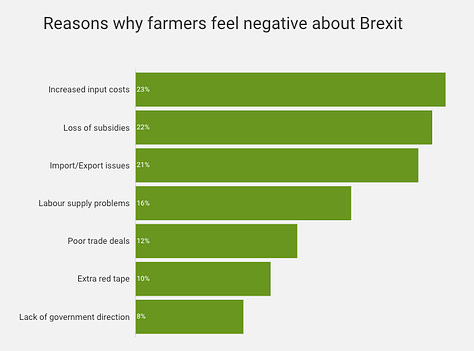
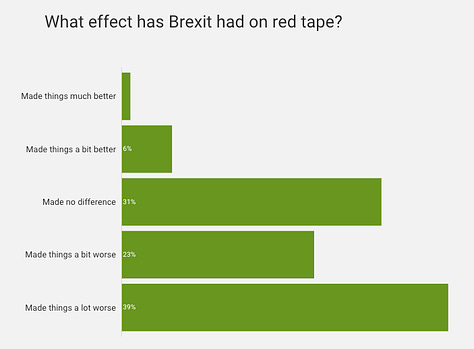
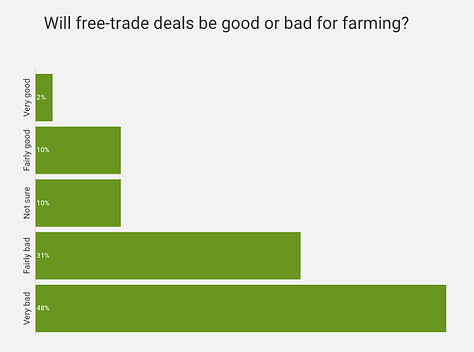
Brexit is also not the only cause of issues—the glorious trade deal with Australia that the previous government championed like it was the Second Coming. That deal flung the gates wide open to cheap imports, leaving British farmers—already struggling to make ends meet—competing against lower-priced, lower-regulated products. Nothing like a bit of free market ideology to spice up your next roast, right? Remember those sunny promises of taking back control? Turns out, it mostly meant controlling the steady decline of British agriculture.
It’s honestly staggering how little Brexit is mentioned when talking about the state of UK farming (trade, immigration and economic growth) today. The subsidies that once made farming viable? Gone. The export markets that used to buy up British produce? Shrunken to a trickle. And instead, we’ve got heaps of paperwork, tariffs, and a government seemingly more interested in making every effort to not acknowledge the impact of cutting ties with our closest trading partner.
But sure, let’s just blithely ignore all that lovely context and blame Stalin.
Why Musk’s Intervention is Dangerous and What We Should Be Talking About
The point of all this? Musk’s comment doesn’t just betray his ignorance—it purposefully serves to ramp up tensions. Farmers don’t need tech bros parachuting in with incendiary takes about “communism” while they’re already furious. And let’s not forget, this is the same Musk who will soon be heading up Donald Trump’s “Department of Government Efficiency2.”
Musk’s flippant intervention also highlights a deeper problem: the ease with which billionaires can insert themselves into debates they barely understand. With one tweet, he trivialises the actual challenges farmers face and completely distracts from any sort of meaningful debate3.
If we genuinely care about British farming, we need to stop indulging Elon Musk’s Stalinist fever dreams and start focusing on the real issues. Farming needs to be profitable, sustainable, and fair. That means tackling land ownership inequality, supporting small farms, and cleaning up the Brexit mess that’s made an already precarious industry even harder to survive in. It means ensuring inheritance tax reforms actually help farmers, not create more bureaucratic hoops for them to jump through.
Instead of spiralling into Musk’s misguided rhetoric, let’s address the absurd cost of machinery that leaves farmers cash-strapped and the policies that have turned rural Britain into a financial minefield. Because if we’re serious about fixing farming, the solution isn’t hot takes—it’s real, structural change.
The long and short of it all? Farmers in the UK need genuine, well-thought-out policies that tackle their actual problems—not hot takes from billionaires looking for retweets. The fight for a fairer, more sustainable future for farming is too important to be derailed by the Twitter tantrums of a tech bro. It’s time for grown-ups to steer the conversation—because if we don’t, farming will remain a political football, kicked around by those who have no skin in the game.
So no, Britain isn’t “going full Stalin.” What’s actually happening is a long-overdue reform of a tax system that’s been a playground for the ultra-wealthy for decades. Musk’s melodramatic intervention doesn’t just miss the point—it derails any serious conversation about farming, taxation, or the future of rural Britain.
And honestly, if Elon Musk insists on weighing in on UK farming policy, the least he could do is learn the difference between a combine harvester and collectivisation.
“Land is a better investment than any bank can offer. The government doesn’t get any of my money when I die. And the price of food that I grow can only go up.” - interview with The Times, 27 July 2013.
Because nothing screams efficiency like a man whose social media platform has the usability of a fax machine on fire. A man who thinks deleting the block button counts as governance will now have an official role in shaping US policy. What could possibly go wrong?
Because let’s be honest, when was the last time Musk contributed anything useful to a conversation that didn’t involve rockets or electric cars?





Hi Bear, thank you it is what I have been saying to family and friends. We own and live on I suppose a smallish farm, 100 acres plus 100 acres off ground. We let it out to local farmers and live in the farmhouse with family all around in converted barns. Our son did not want to farm, so we are waiting for the next generation to see if one of 3 boys or 2 girls will want to take it on. I think it is only fair that there should be Inheritance tax on the large scale farms , as other businesses have to pay theirs. A farms land cannot be picked up and moved like many other types of businesses can, therefore more limiting. So I suppose I sit on the fence seeing both sides. I see the value of tractors and machinery has gone up enormously, and the makers ie Lord Bamford, JCB, instead of paying £500,000,000 to HMRC, doing a bunk to Cyprus or wherever he has gone to! How does he make that much and why are the government not going after him and many others who owe HMRC big time? I have heard that he and his wife let an ex prime minister live free of charge in a spare house they owned worth several millions, can't we take that and sell it off and maybe a few others as well? That would cover the interest on the debt. I agree Brexit and the dreadful trade deal are responsible for farmers not being able to make worthwhile living / profits, and I hope that farming friends don't get too carried away with all the hype being banded around by those who have hung to or bought land as an investment, Dyson, Clarkson plus Mogg and many more! I say well done to close the loophole.
Huge thanks for this article, Bear. You are the only person I have seen who has spoken the truth. As a rural, very much countryside dweller pretty much all of my life, with farming neighbours (mainly tenant farmers, but one exception), I have seen first hand the damage that Brexit has done to agriculture, and that nonsensical deal with Australia and New Zealand has made livestock farmers literally take their own lives. This is not the way to treat people who grow our food. We need to be robust about agriculture, sort out the "tax avoidance" merchants and treat them like the vermin they are whilst at the same time, supporting proper farmers and thus securing our food production. Thank you again.